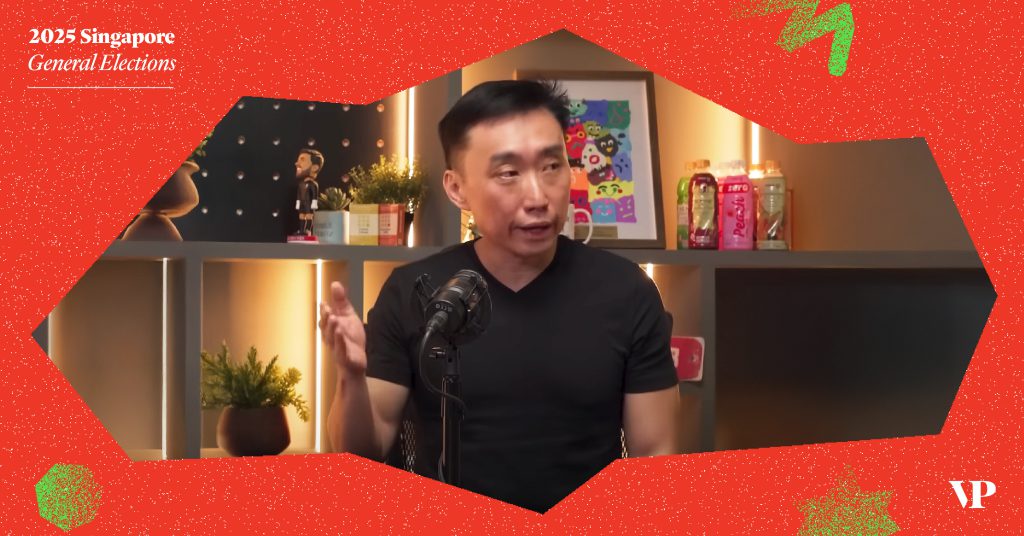"Every election is the PAP's to lose": Ex-NMP Calvin Cheng on Singapore's political scene
3 days ago
As GE2025 draws near, an increasing number of politicians and thought leaders have begun voicing their perspectives on Singapore’s political landscape.
In a recent episode of The Daily Ketchup, former Nominated Member of Parliament Calvin Cheng shared his insights on crucial factors shaping voter decisions and his predictions for the upcoming elections.
Here are some key takeaways from the podcast:
1) PAP’s dominance is an “anomaly” in a FPTP Westminster systemCalvin started off strong, asserting that “every election is the PAP’s to lose” from now on.
He explained that the People’s Action Party’s (PAP) current dominance—holding over 90% of the seats in Parliament—is an “anomaly” in a First Past The Post (FPTP) Westminster system, primarily due to the legacy of Lee Kuan Yew and the pioneering leaders, who transformed the nation from the third world to the first.
Given how Singapore’s political landscape has evolved over the years, the city-state is now in the “early days” of the rise of a second dominant party—and right now, it seems “very likely” that the Workers’ Party (WP) will fill that role.
Calvin also pointed out that once a second party becomes established, a third party would struggle to gain traction.
“If any party wants to challenge them, they need to [do it] right now, because once the second party gets into that dominant position, in the First Past The Post system, there cannot be a third—it’s almost unlikely for there to be a third party.”
He argued that it’s naive to assume opposition unity, as each party has its own “brand, manifesto, and principles.”
However, Calvin believes that the Progress Singapore Party (PSP) could stand a chance against WP, but remains skeptical about the party’s ability to “sustain” itself, as it seems “very reliant on the persona of its founder,” Dr. Tan Cheng Bock.
2) What matters most to Singaporean votersThat aside, the decisive factor in elections—whether in Singapore or globally—ultimately comes down to bread and butter issues.
Bread and butter issues are always top concerns for voters, and the PAP could face challenges in future elections due to cost of living concerns, especially because voters are more likely to “remember the impact of past inflation and GST hikes, even if inflation has decreased.”
However, timing also plays a crucial role.
For instance, core inflation in Singapore dropped to 0.8% in January and further dipped to 0.6% in February, but Calvin noted that “people are not going to feel that at the moment. They’re going to remember that prices were going up, they suffered from inflation, they remember the GST increases.”
“So, in my opinion, if PAP waits longer, they’ll have better chances as Singaporeans feel the effects of lower inflation,” he shared.
Compared to economic concerns, cultural issues, such as the impact of the 377A repeal, on the other hand, play a less decisive role in Singapore’s elections.
“I don’t think we have reached a stage where these cultural issues are make or break yet. People are not going to vote on single issues,” he added.
3) Does gerrymandering work in Singapore?On March 11, the Electoral Boundaries Review Committee (ERBC) announced major changes to Singapore’s electoral divisions ahead of GE2025, leaving only five Group Representation Constituencies (GRCs) and four Single Member Constituencies (SMCs) unchanged from the previous election.
This has sparked criticism from the opposition, with some accusing the government of gerrymandering.
However, Calvin argued that gerrymandering is unlikely to be effective in Singapore due to the country’s lack of demographic clusters—it only works when certain groups are concentrated in specific areas, like in the US or UK, where race or class divides are prominent.
Rather than gerrymandering, the key issue, in Calvin’s opinion, is the late announcement of the electoral boundaries, which hampers smaller opposition parties.
He explained that the PAP has the resources to cover the entire island, but smaller opposition parties struggle because they don’t know the boundaries in advance, making it harder for them to effectively campaign.
-//-In the podcast with The Daily Ketchup, Calvin has also shared his insights on the strengths of the opposition, the role of the media in politics and the reintroduction of physical rallies.
You can watch the full episode here:
Featured Image Credit: Screengrab from The Daily Ketchup, designed by Vulcan Post
...Read the fullstory
It's better on the More. News app
✅ It’s fast
✅ It’s easy to use
✅ It’s free









